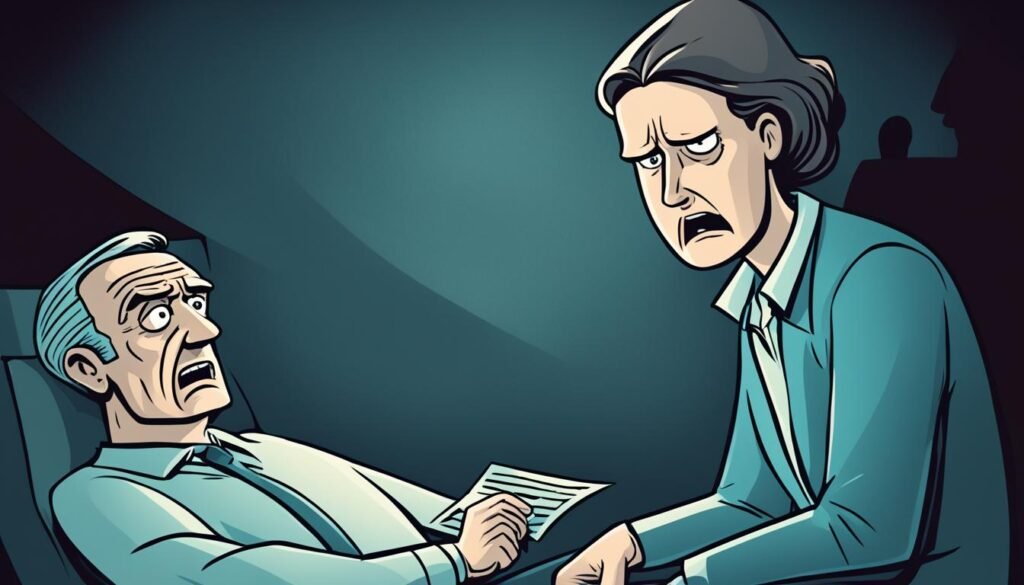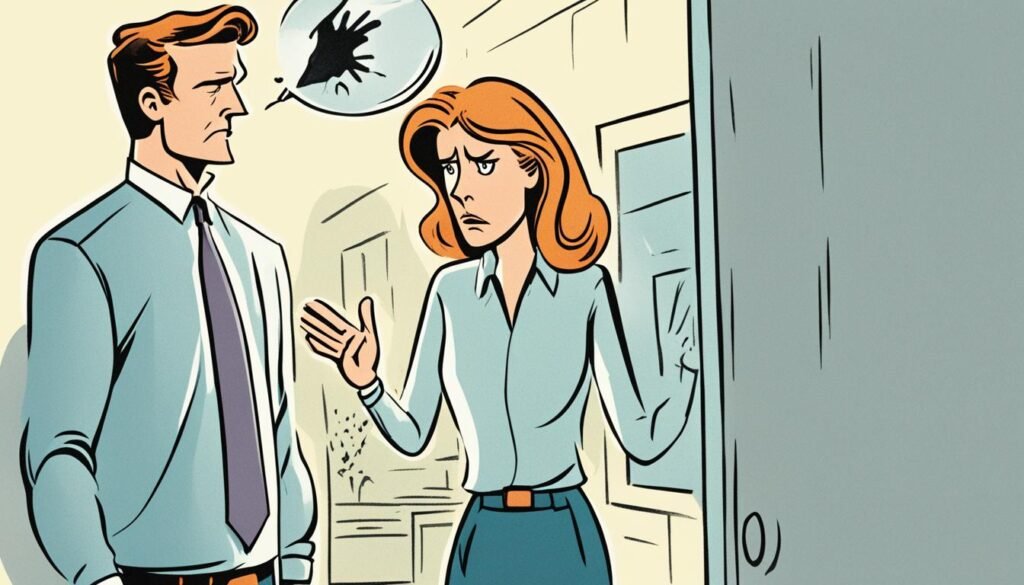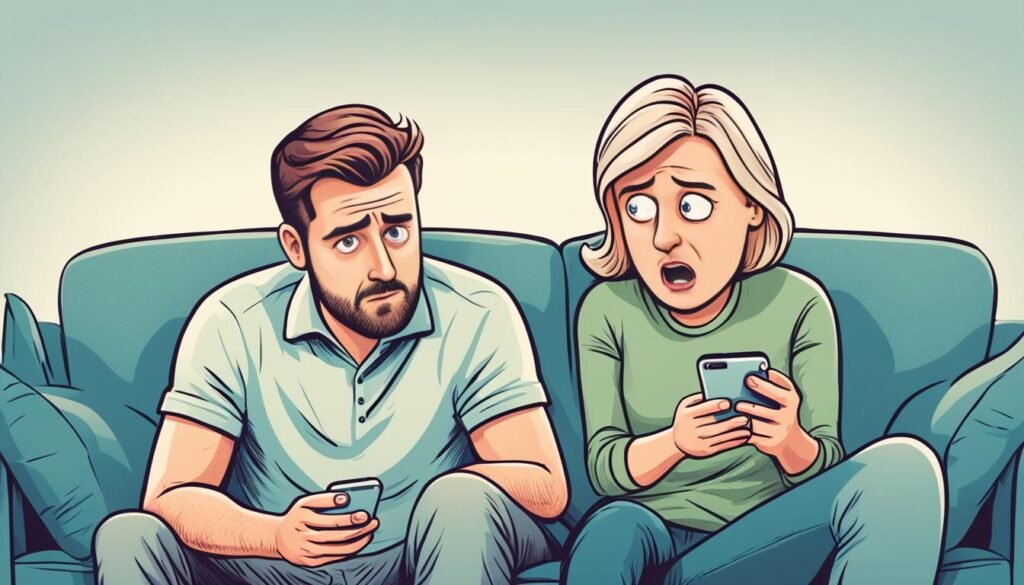
Signs of an Unhealthy Relationship: Red Flags to Watch
Did you know 34.4% of students at Arizona State University struggled with their intimate relationships last year? This fact shows why it’s vital to spot an unhealthy relationship early. Knowing these signs can protect our mental and emotional health. This includes not just romance, but also friendships and work relationships.
Red flags are serious signals to watch for in relationships. They can grow worse if ignored. From controlling actions to sneaky manipulation like emotional abuse or gaslighting, these behaviors can hurt your mental health and life quality.
It’s important to understand and see these warning signs. Bad behaviors such as jealousy, manipulation, and sabotage hurt your sense of self and cut you off from friends and family. Knowing the early signs of trouble can help keep your mental and emotional health safe.
Key Takeaways
- Jealousy often leads to controlling behaviors.
- Manipulation is a common red flag in unhealthy relationships.
- Isolation from friends and family is a significant indicator.
- Sabotaging achievements or reputation is a warning sign.
- Negative comments and belittling behavior are key signs.
Introduction to Unhealthy Relationship Signs
Knowing the
can help spot trouble early. This can stop problems from getting worse.
A clear sign of trouble is when one person tries to control everything. They might keep their partner away from friends or family. Research shows that in good relationships, partners respect each other and communicate well. But in bad ones, one person might make threats or unfair demands.
“Clocking” means watching someone’s social media too much. It can cause mistrust and stress. Lies and deceit break down trust too. They fill a relationship with doubt.
When someone makes fun of their partner, that’s disrespect. Harsh words or actions can make someone scared to speak up. This can even lead to harassment, which makes someone feel unsafe.
Intimidation and physical harm are serious relationship red flags. They are used to scare someone into doing what the other wants. Sexual violence is another extreme, forcing someone into sexual acts.
Spotting unhealthy relationship patterns early is key. Even small issues can turn into big problems. Being aware of these signs helps people choose better relationships.
What Are Red Flags in a Relationship?
Understanding red flags is key for your emotional and mental health. They are signs that warn us about unhealthy or controlling behavior. If not checked, these can turn into bigger problems over time.
Many relationship red flags include being too controlling, not trusting each other, feeling bad about yourself, experiencing abuse, and using substances too much. Spotting these manipulative signs early helps stop worse issues. Trust is crucial for any good relationship, and not having it shows big problems.
The following table points out common red flags and what they mean:
| Red Flag | Implication |
|---|---|
| Overly controlling behavior | Loss of personal freedom and autonomy |
| Lack of trust | Major instability in relationships |
| Substance abuse | Potential for self-destructive habits |
| Narcissism | Self-obsession and misplaced sense of importance |
| Anger management issues | Frequent conflicts and unresolved disputes |
| Constant jealousy | Undermines trust and fosters insecurity |
| Gaslighting | Alters one’s reality and erodes self-confidence |
| Victimization | Perpetual feelings of guilt and blame |
| Lack of emotional intelligence | Difficulty in empathizing and understanding each other |
It’s crucial to address red flags right away to avoid emotional, psychological, or physical damage. Ignoring these signs of a toxic relationship can make things worse. Staying alert to these signs helps create a supportive and healthy relationship for everyone.
Overly Controlling Behavior
Overly controlling behavior is a big warning sign in any relationship. Spotting the signs early can make a huge difference. It affects more than just day-to-day choices; it can harm self-esteem and lead to serious mental effects.
Signs of Controlling Behavior
Controlling behavior shows in many ways. Here are key signs to be aware of:
- Micromanaging: They try to control all parts of your life, from money to friends.
- Isolation: They slowly cut you off from family and friends, making you depend only on them.
- Jealousy and possessiveness: They show too much jealousy and suspect you without reason.
- Decision-making: You feel you must ask their “permission” for your choices or can’t decide on your own.
- Emotional manipulation: They use guilt, anger, or tricks to control you.
A lot of people face severe intimate partner violence, which often includes controlling behaviors. 1 in 4 women and 1 in 7 men will experience it. This control might seem caring but usually makes one feel small and dependent.
Psychological Impact
The mental impact of controlling behavior is big. Victims may feel anxious, depressed, and hopeless. The controlling person might seem needy, making you feel you must handle their feelings.
| Type of Control | Example | Psychological Impact |
|---|---|---|
| Micromanaging | Monitoring phone calls and text messages | Anxiety, loss of privacy |
| Isolation | Discouraging interactions with family | Loneliness, dependency |
| Jealousy | Interrogating about whereabouts | Fearfulness, stress |
| Decision-making | Forcing career choices | Lack of autonomy, resentment |
| Emotional manipulation | Guilt-tripping for spending time with friends | Guilt, lowered self-esteem |
It’s important to know the difference between compromise and manipulation in a relationship. True relationships are based on respect, trust, and understanding. Spotting controlling behavior early can stop more mental harm and keep you well.
Lack of Trust and Constant Jealousy
Being in a relationship without trust is very hard. Constant jealousy can harm the bond between partners. A healthy relationship needs trust as its foundation.
Impact of Jealousy
Jealousy stems from a fear of not being good enough or losing something valuable. It leads to negative actions. When jealousy is always there, it can result in one partner trying to control the other. This makes resentment grow and trust lessen even more.
Stress and conflict can make jealousy and trust issues worse. Partners may demand to know where the other is all the time. They might also keep a close eye on social media and texts. This behavior can make someone feel very alone.
Being controlling or too possessive makes things harder. One partner might feel trapped, and the other might always need reassurance. This imbalance hurts the relationship a lot. Breaking this cycle needs work and open talking from both sides.
“Lack of trust and jealousy can lead to paranoia and obsession, resulting in significant relationship strains.” – Anonymous Relationship Expert
Fixing a relationship with these problems takes both people wanting to make things better. They need to stop unhealthy actions, be more open, and talk more. This can help reduce jealousy and build trust again.
| Trust Issue | Effect on Relationship |
|---|---|
| Lack of Open Communication | Increased Misunderstanding and Conflict |
| Frequent Jealousy | Emotional Distance and Resentment |
| Controlling Behavior | Suffocation and Isolation |
In conclusion, dealing with trust issues and jealousy is key to a better and supportive relationship.
Signs of an Unhealthy Relationship: Emotional Abuse and Gaslighting
Emotional abuse and gaslighting are toxic signs in a relationship. They deeply affect one’s mental health and self-esteem. It’s key to understand emotional abuse to recognize its signs, as victims often don’t see they’re being manipulated.
Understanding Emotional Abuse
Emotional abuse aims to control or hurt someone emotionally. Signs often include constant criticism or blaming, making the victim feel worthless. It’s a way to hurt one’s confidence and self-worth.
Gaslighting is a very harmful form of emotional abuse. The abuser makes the victim doubt their reality, leaving them confused and isolated. Over time, victims lose their self-assurance, becoming dependent on their abuser.
Some common signs of emotional abuse and gaslighting include:
- Constantly second-guessing oneself
- Feeling confused and crazy
- Always apologizing to the partner
- Struggling to make simple decisions
- Feeling hopeless and without joy
Gaslighting starts with small things and gets worse over time. The victim’s sense of reality gets twisted, making it hard to trust themselves. As this happens, they feel more insecure and lost in what to believe.
It’s vital to see these signs and get help, like from the National Domestic Violence Hotline. Getting professional help can heal the damage done by emotional abuse. This support works to improve the victim’s mental health and self-worth.
“Gaslighting is a form of emotional abuse that causes a victim to question their own feelings, instincts, and sanity.” – National Domestic Violence Hotline
Understanding emotional abuse helps individuals regain their confidence. This way, they can avoid toxic relationships that harm their emotional health.
Codependency and Over-Reliance
Codependency often starts due to past experiences and emotional hurts. It’s key to know that codependency in relationships might come from bad parental relations, living with sick family members, or being in abusive settings while growing up. Children from homes with addicted parents or emotionally immature ones are at high risk for these behaviors.
Those who grew up caring for sick family may ignore their own needs. They get used to putting others first. This behavior can lead to codependency in relationships outside the family.
People who faced any form of abuse might hide their emotions and make others’ needs a priority. This is a clear sign of codependency.
Effects of Codependency
Codependency can greatly affect your growth and how healthy your relationships are. Signs include being overly cautious, saying sorry a lot, and always putting the other person first. This can make someone lose sense of who they are over time.
In relationships with codependency, there usually is a power imbalance. One person always gives, and the other takes. This can lead to even worse relationship dynamics and a stronger loss of self for the giver.
It’s important to deal with these issues. Therapy can help a lot. It lets people look at their feelings and behaviors on their own, helping them work through past hurts. Working on self-awareness and getting support from others can lead to personal growth and overcoming codependency.
Knowing what you need, being around supportive people, and going to therapy are critical steps to beat codependency. Groups like Codependents Anonymous (CoDA) provide a safe place to recover. Understanding the many factors that cause codependency can help someone build healthier, more balanced relationships.
Disrespect and Poor Communication
Disrespect and poor communication are often not obvious but harmful signs in a relationship. Ridicule, not caring for someone’s feelings, and talking down can cause deep problems and emotional pain. It’s important to see these bad signs to stay mentally and emotionally healthy.
Research shows how couples talk to each other predicts if they’ll be happy together better than stress or personality. Relationships with disrespect and bad communication can hurt feelings and make someone feel worthless.
Examples of Disrespect
Disrespect shows up in different ways. Here are some common signs to watch out for in a relationship:
- Ridicule and Mockery: Making fun of your partner to put them down.
- Dismissiveness: Not caring about what your partner feels or thinks.
- Overstepping Boundaries: Misusing personal info or acting like you know your partner’s thoughts.
- Defensiveness: Not listening and quickly getting upset during arguments.
Bad relationship behaviors like these are serious. While everyone messes up sometimes, Grady Shumway, a mental health expert, says often bad communication points to bigger issues.
Good communication and respect are key to a strong relationship. Building a positive way of talking to each other can prevent problems and create a deeper bond.
Physical, Mental, and Emotional Abuse
It’s important to recognize signs of abuse in any relationship. Abuse can be physical, like hitting, or mental, involving manipulation and isolation. Emotional abuse is also common, forming the basis of many abuse types.
A report from The Hotline in 2020 shows that 95% of people reaching out faced emotional abuse. This kind of abuse often makes someone depend on their abuser. It’s hard for them to seek help or even see the abuse they’re enduring. Emotional abuse can get worse, sometimes turning into physical harm. It includes actions like name-calling and controlling the victim’s life.
Over 12 million Americans have faced emotional abuse from a partner. But it’s not just in relationships. Emotional abuse at work can make work life very stressful. Kids who are emotionally abused try hard to keep peace at home or make their parents happy.
The effects of emotional abuse vary, causing feelings of fear, sadness, or even physical pain like headaches. It can lead to serious mental health issues such as PTSD. Getting help quickly is key to staying safe and starting to heal.











